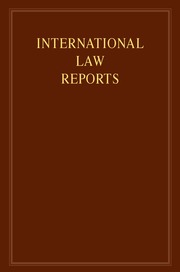Article contents
Madzimbamuto v. Lardner-Burke. Baron v. Ayre, Bezuidenhout, Dupont and Lardner-Burke.
Published online by Cambridge University Press: 01 January 2021
Abstract
International law — Relation to municipal law — Jus gentium — Doctrine of State necessity — Whether part of law of Rhodesia — De jure and de facto Government — Use of international law definition by municipal court — Whether same test to be applied.
States as international persons — Sovereignty and independence In foreign relations — In matters of domestic jurisdiction — Rhodesia — Independent statehood of — Evidence of — Internal autonomy — Colonial status — Power to legislate extra — territorially incompatible there with — Power to confer citizenship — Power to make treaties — Membership of international organizations — Whether sovereignty divisible — Possession of internal sovereignty by one State while another State exercises powers of external sovereignty — Semi — independent States — Whether domestic court has jurisdiction to adjudicate on status of revolutionary Government.
Recognition — Of Governments — De facto, de jure, effective Government, and Government “for the time being” — Meaning of terms — Establishment of new Government by revolution — Relevance of international recognition — Whether recognition a political act or an objective legal appreciation of facts — Whether internal sovereignty depends on external recognition — Whether success of revolution depends on acquiescence or recognition — Whether a question of fact — Requirements of effectiveness and continuity — Evidence — Certificate from Secretary of State for Common wealth Relations — Whether conclusive on courts of territory in which revolutionary Government is operating — Whether court can take judicial notice of what is going on around it — Non — recognition Effect of — Whether a vacuum in the law — Whether court can recognize legislation and administrative acts of unrecognized Government — Doctrine of State necessity — Validity of acts of unrecognized or unlawful Government — Tests — Burden of proof.
International organizations — Membership of — As evidence of independent statehood — United Nations Security Council — Resolutions of — Rhodesia — Effect of Resolutions — Whether constituting international recognition — Whether implying statehood.
States as international persons — In general — Beginning of State existence — Colonies — Rhodesia — Revolution — Acquisition of sovereignty by — Whether a legal order ceases to have validity when it loses efficacy — Whether new legal order acquires de jure validity retrospectively by replacing old order — Whether this doctrine applies to colonies — Constitutional status of Rhodesia — Whether unilateral declaration of independence a “fundamental change of circumstances” — International status of Rhodesia — Whether a State — Acquiescence and recognition — Relevance of — International organizations — Membership of — Relevance of — United Nations Security Council — Resolutions of — Relevance of — Internal and external sovereignty — Whether internal sovereignty depends on international recognition — Whether a question of fact — Duty of judges — Authority of court — Whether derived from 1961 Constitution or 1965 Constitution or from de facto Government.
- Type
- Case Report
- Information
- Copyright
- © Cambridge University Press 1970
- 2
- Cited by




